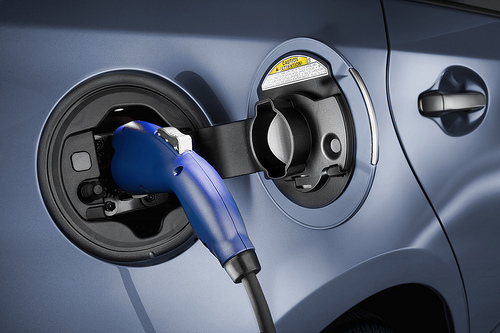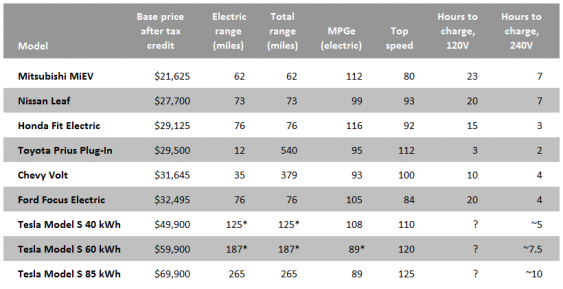I’ve been thinking about upgrading to an electric car for a while now. And in today’s market, there are plenty of models to choose from.
But having a lot of options makes for a complicated decision! Each model of electric car has its own unique mix of efficiency, charging time, and driving range—and since buying a car is a big decision, I want to find the model that makes the most sense for my family. To add to the confusion, there doesn’t seem to be any single, unified source of information on the many electric car options out there.
So, for my own convenience—and hopefully yours—I pulled together a table with basic stats on the major electric and plug-in hybrid cars…
(Click the table to see a larger version.)
What I took away from this research is that there’s no “perfect” choice among the EVs on the market. They’re all far more efficient in electric mode than gas-only models. That means less money spent on fueling your car, and lower levels of greenhouse gas emissions for each mile driven. But whether you’re willing to pay a premium for a longer range, a faster charge, or a higher top speed seems like a personal choice that I can’t help you out with.
But at least you now have the numbers. Happy comparing!
And now for the notes and caveats:
- I’ve restricted my search to electric and plug-in hybrid sedans that can carry at least 4 people—which is what my own family needs most days of the week—and to cars that are either on the market right now, or are expected to be offered later this year, in at least some part of the Pacific Northwest. I decided not to include a couple of cars—the Coda and the Toyota RAV4 EV—that are only being sold in California right now. If I’ve missed some cars, let me know in comments and I’ll be happy to update the table!
- MPGe stands for “miles per gallon equivalent“—which is how the EPA rates the efficiency of electric vehicles.
- I sorted the models by base MSRP (manufacturer’s suggested retail price) minus the maximum US tax credit allowed for that model. But note that you only get the full tax credit if you actually owe that much in federal income tax! Also, I decided not to include the cost of installing an in-home 240V charger in the vehicle price, since people with ready access to a public charging station might not need one.
- Some of the figures above are estimates, rather than official figures. I did my best, but unfortunately you may need to check the official figures as they’re released.
- The Honda Fit EV isn’t actually available for sale yet. A limited run will be leased to customers in Oregon and California beginning this summer. I’ve included its MSRP price (with tax credit) for comparison’s sake, but folks who lease a Honda Fit aren’t even allowed to buy it after the lease is over. That means that the price I quote is sort of irrelevant at this point.
- Retail deliveries for the Tesla Model S are scheduled to begin in June, but it looks like the smaller-battery models won’t be shipped until late 2012. I wasn’t able to find solid data on 120V charging times on the Tesla website, and the 240V charging time estimate can be cut in half if you buy an optional “twin charger” for $1,500. The Tesla website quotes a 300 mile range for its 85 kWh model…but recently announced that its range is 265 miles under EPA’s new test cycle, which makes me suspect that the ranges for the 40 and 60 kWh models may be slightly overstated—thus the asterisk. UPDATE: In the comments section, a reader points out that a previous version of this table likely overstated the range 40 and 60 kWh Tesla Model S—he recommends adjusting downwards, based on the results of recent EPA tests on the 85 kWh model. I’ve kept the MPGe figure from the Tesla website for the 40 kWh model, but we should probably treat the Tesla figures as preliminary until official numbers are released.
- The MPGe (miles per gallon-equivalent) figures for the Prius Plug-in and Chevy Volt are for electric-mode only. The Volt gets 37 mpg in all-gas mode, and the Prius gets 50 mpg.
- And as a reminder, the differences in miles-per-gallon equivalent (MPGe) in all-electric mode are actually quite small. As we’ve written a number of times, miles-per-gallon math is actually quite deceptive: differences at the low end of the MPG scale matter much more than do differences at the high end of the scale. So the difference between the top performer (the Honda Fit, at 116 MPGe) and its closest rival (the Mitsubishi MiEV, at 112 MPGe) is actually quite small.
(Sources for the chart include the manufacturers’ websites, Wikipedia, FuelEconomy.gov, and Motor Trend Magazine.)



Comments are closed.